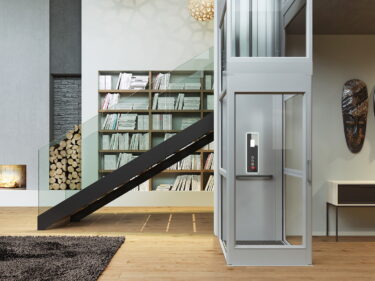Full Guide : All you need to know about home elevators
Home elevators are considered a basic component for some houses nowadays, and they no longer relevant to luxury villas only. However, getting a lift is not cheap, unlike other home accessories. Home elevators come with a somewhat complicated cost of construction, which may include interior fixing or switching of electrical wiring and sanitary pipes.
In this page, we share all information that you need to know about home elevators.
June 28, 2022
June 28, 2022

Frequently Asked Questions about Home Elevator
The cost estimates relate to several factors, such as the required lift size and the number of floors. Of course, though, you will not be able to get accurate estimates.
The average speed of household elevators can reach 1 meter per second, and the elevators are manufactured according to international safety and security standards, for a satisfactory and sound experience.
Residential and commercial elevators vary in size and weight, but are similar in terms of safety.
As a result, you need to set your budget, and benefit from maintenance offers. If a member of your family needs an easier method to climb stairs, home elevators are the best solution. With many options for designs and cost, finding the best elevator is even easier.
We have few different types of residential elevators, so this depends on the model that you choose. For most standard residential elevators, there can be up to six total stops. Through the floor elevators, however, are designed to only travel between 2-3 floor levels.
Yes, an elevator can be added to a home that has already been built. CoLift provides the construction and installation services. We can help you find the best location in your home for the elevator to help you save some money and seamlessly fit with the design of your home.
Yes. Just like your automobile, furnace, or air conditioner, a residential elevator is a mechanical investment. Maintenance costs will vary based on the location of the elevator, amount of use and the lifting system.
In general, it requires 5' x 5'. Some instances will call for a slightly larger location, some will require less. Each individual elevator is unique.
A home elevator looks very similar to a commercial that you see at local malls and retail stores. It is a rectangular box that can come in a variety of finishes. You can visit our style & design page to see the options that you can choose from.
“Through the floor” residential elevators, however, look a bit different than your standard elevator. They are often described to look like old telephone booths.
This depends on numerous factors. A home elevator costs a lot more than a stair lift, but it is more of a luxurious addition and also adds value to a home. If you are looking for a quick and more affordable solution, then a stair lift is the better solution. If getting on and off of a chair is too difficult for the user, then a residential elevator would be a better and safer solution.
The manufacturers we represent provide a battery backup system that is standard with your residential elevator. In the event of a power failure, the battery takes over control of the system and safely takes you to the nearest floor landing so that you can exit the elevator.
Yes, residential elevators are safe to ride. Residential elevators are built to meet very stringent safety standards. Additionally, the elevator must meet state and local codes and inspections.
Fact: You are less likely to get injured in an elevator than climbing a set of stairs!
There are different types of home elevators available for installation. Some considerations are space and cost, but many types are far less expensive than you might expect. The home elevators we install range from the traditional hydraulic drive system which requires space for a machine room to an innovative solution called a "vanishing" elevator that travels on a guide rail system through a floor cut-out.
The amount of construction that will take place for the installation of a home elevator depends on the type of elevator model selected and whether or not the home is new or existing.